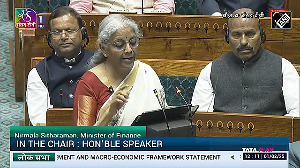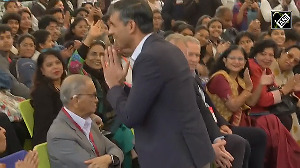The duo will face a trial in a few weeks. Judge David Wesley said they violated a court order by speaking to each other.
A jury decided Jon was guilty of sexual crimes last November. Among the jurors was Dymally, 'juror number 12'.
He met Sanjana during the trial and gave her his number. She called him, but refused to meet with him alone. There was a perception that the case would go for a retrial because of the 'alleged romantic relationship between the two.'
Dymally spoke to Sanjana twice on the phone during the trial and offered help.
But the prosecution said such interactions did not affect the jury's vote during the verdict. Dymally voted to convict Jon along with the other 11 jurors last November.
Sanjana had recorded the phone conversations with Dymally.
In the first call, Dymally asked Sanjana if she was married. 'You're real warm, real, very affectionate ... I think you're really sexy and you look great ... I love your eyes and leave your hair long,' he said.
She only responded saying, 'Thank you.' He promised to do every possible thing he could to help.
She thanked him again and he said, 'Probably afterward we can meet.'
In a second conversation, he asked for a meeting. But the judge said his motivation was unclear and there was no proof Dymally was trying to 'sell his vote for sex or money.'
'The court finds the misconduct did not have an effect on the juror's ability to be fair,' the judge ruled.
Jon's lawyers said Dymally voted against the designer because Sanjana did not meet him.
'This is a total travesty of justice. I did not go meet with him. If I did, this wouldn't have happened,' Sanjana said later.
The judge said it was an act of contempt of court for contacting the juror and failing to report it to the court.
Sanjana said she did not report Dymally's phone calls because she was scared. The judge said Dymally violated court instructions and also lied on the witness stand about his conversations with Sanjana.
But the judge concluded that the conversation had no effect on the juror's vote.
'It is settled law in this state that a new trial will not be granted where there is misconduct of such a trifling nature,' the judge said in July.
"The judge refused a new trial because he believed the juror did not ask Sanjana for anything in exchange for a vote nor was he told anything about the case," attorney Ronald Richards, associated with Jon's defence team, said earlier.
After the verdict, Dymally tried to meet Sanjana. A meeting was set up at a Starbucks cafe and she informed her attorneys and the judge about it. The judge approved the secret taping of the conversation.
When Dymally appeared at the Starbucks, officers deputed by the prosecution prevented him from meeting her. So what he wanted to say to her was never revealed. The opportunity to know what he wanted to say was lost.
Jon's attorneys said the undercover operation was designed to catch a juror in an act of misconduct, but the prosecution sabotaged it.
'Defendants have a right to have their cases heard by 12 impartial jurors. To win a new trial, defence attorneys need to show that just one juror committed misconduct that prevented a fair trial. ..Why does it matter what this one juror did? (Because that's) how our system works,' Jean Rosenbluth, a law professor at the University of Southern California and a former federal prosecutor told The Los Angeles Times earlier.
One reason for demanding a new trial is because of jury behaviour. Three days before the jury's decision, Dymally told Judge Wesley that others were pressurising him against his will.
On the fourth day of deliberations, the jury foreman -- in a note to the judge -- said 'We can no longer deliberate with Juror No 12 (Dymally). He does not understand 'reasonable doubt' and does not listen to the evidence.'
Along with the foreman, the prosecution also asked to remove Dymally, which Jon's lawyers opposed.
After Judge Wesley questioned each juror, it became clear Dymally early on had announced that he had arrived at conclusions about the testimony of each of the trial's witnesses and would not be swayed by discussions, media reports said.
'Due to my opinions, other jurors have shown high emotions to my verdict and are extremely angry at me. I feel I am being pressured to give a verdict I don't want to give,' he told the judge, according to reports.
The judge sent him back to the other jurors.






 © 2025
© 2025